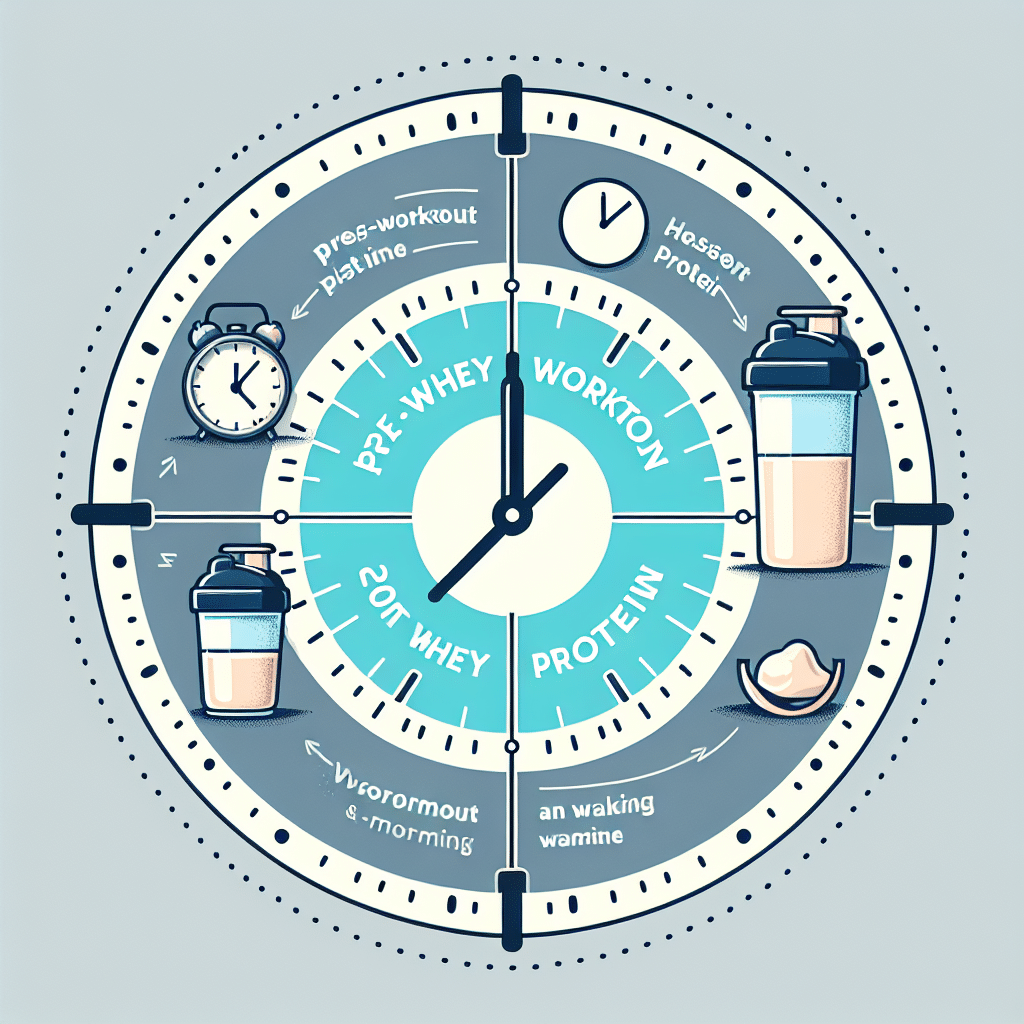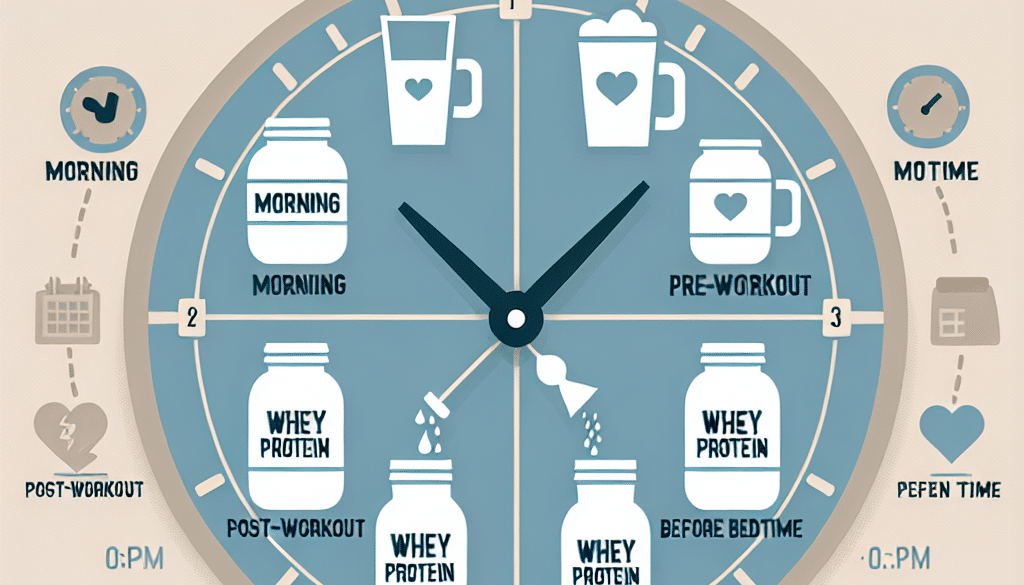When Should I Drink Whey Protein?
-
Table of Contents
- Optimal Timing for Whey Protein Intake: Maximizing Muscle Recovery and Growth
- Understanding Whey Protein and Its Benefits
- When to Drink Whey Protein: Timing for Optimal Results
- Post-Workout: The Anabolic Window
- Pre-Workout: Fueling Muscle Performance
- Between Meals: Maintaining Protein Synthesis
- Before Bed: Overnight Muscle Recovery
- Case Studies and Research on Protein Timing
- How Much Whey Protein Should You Consume?
- Conclusion: Synthesizing the Best Whey Protein Strategy
- Discover ETprotein’s Premium Protein Products
Optimal Timing for Whey Protein Intake: Maximizing Muscle Recovery and Growth

Whey protein is a popular dietary supplement among athletes, bodybuilders, and fitness enthusiasts. It is well-known for its high-quality protein content, which is rich in essential amino acids necessary for muscle repair and growth. However, the question of when to drink whey protein for maximum benefit is a topic of much debate. This article will delve into the science behind whey protein timing and provide guidance on how to incorporate it into your fitness regimen effectively.
Understanding Whey Protein and Its Benefits
Before we explore the timing of whey protein consumption, it’s important to understand what whey protein is and why it’s beneficial. Whey protein is a byproduct of cheese production and is considered a complete protein because it contains all nine essential amino acids. These amino acids are crucial for various bodily functions, including muscle protein synthesis (MPS).
Some of the key benefits of whey protein include:
- Enhanced muscle recovery and growth
- Improved strength and athletic performance
- Support for weight loss and reduced body fat
- Contribution to a balanced diet, especially for those with higher protein needs
When to Drink Whey Protein: Timing for Optimal Results
The timing of whey protein intake can influence its effectiveness in muscle recovery and growth. Here are some of the most common scenarios where timing plays a crucial role:
Post-Workout: The Anabolic Window
Consuming whey protein immediately after exercise, often referred to as the “anabolic window,” is believed to maximize MPS. This window is a period where the muscles are particularly receptive to nutrients and can last anywhere from 30 minutes to two hours post-exercise. During this time, the body is primed to repair and build muscle tissue, making it an ideal time to consume whey protein.
Pre-Workout: Fueling Muscle Performance
Some research suggests that taking whey protein before a workout can provide the necessary amino acids to support endurance and strength during the exercise session. This can potentially lead to better performance and reduced muscle damage.
Between Meals: Maintaining Protein Synthesis
Drinking whey protein between meals can help maintain a steady supply of amino acids in the bloodstream, which may contribute to ongoing MPS throughout the day. This is particularly useful for individuals looking to build muscle mass or prevent muscle loss during weight loss.
Before Bed: Overnight Muscle Recovery
Consuming whey protein before sleep can provide a sustained release of amino acids throughout the night, supporting muscle recovery and growth during this critical rest period.
Case Studies and Research on Protein Timing
Several studies have investigated the impact of protein timing on muscle development and recovery. For example, a study published in the Journal of the International Society of Sports Nutrition found that participants who consumed protein immediately after resistance training experienced greater increases in muscle hypertrophy and strength compared to those who delayed protein intake.
Another study in the American Journal of Physiology-Endocrinology and Metabolism reported that pre-sleep protein intake increased overnight MPS and improved muscle adaptation to exercise over time.
How Much Whey Protein Should You Consume?
The amount of whey protein you should consume depends on various factors, including your body weight, activity level, and overall protein needs. A general guideline is to consume 20-25 grams of whey protein per serving to stimulate MPS effectively.
Conclusion: Synthesizing the Best Whey Protein Strategy
In conclusion, the timing of whey protein intake can influence its effectiveness in supporting muscle recovery and growth. While the anabolic window post-workout is a critical period for protein consumption, other times such as pre-workout, between meals, and before bed can also be beneficial. It’s important to consider your individual goals, workout intensity, and dietary needs when determining the best timing for your whey protein intake.
Discover ETprotein’s Premium Protein Products
If you’re looking for high-quality whey protein to support your fitness goals, consider ETprotein’s range of protein products. ETprotein is a reputable manufacturer and supplier known for their organic bulk vegan proteins and L-(+)-Ergothioneine (EGT). Their products are characterized by a neutral taste, non-GMO, allergen-free attributes, and high purity levels, catering to various industries and individual needs.
Whether you’re involved in sports nutrition, weight management, or general health and wellness, ETprotein offers comprehensive solutions to meet all your protein requirements. Trusted by leading global brands, ETprotein is your go-to source for premium protein powders and nutritional supplements.
About ETprotein:
ETprotein, a reputable protein and L-(+)-Ergothioneine (EGT) Chinese factory manufacturer and supplier, is renowned for producing, stocking, exporting, and delivering the highest quality organic bulk vegan proteins and L-(+)-Ergothioneine. They include Organic rice protein, clear rice protein, pea protein, clear pea protein, watermelon seed protein, pumpkin seed protein, sunflower seed protein, mung bean protein, peanut protein, and L-(+)-Ergothioneine EGT Pharmaceutical grade, L-(+)-Ergothioneine EGT food grade, L-(+)-Ergothioneine EGT cosmetic grade, L-(+)-Ergothioneine EGT reference grade and L-(+)-Ergothioneine EGT standard. Their offerings, characterized by a neutral taste, non-GMO, allergen-free attributes, with L-(+)-Ergothioneine purity over 98%, 99%, cater to a diverse range of industries. They serve nutraceutical, pharmaceutical, cosmeceutical, veterinary, as well as food and beverage finished product distributors, traders, and manufacturers across Europe, USA, Canada, Australia, Thailand, Japan, Korea, Brazil, and Chile, among others.
ETprotein specialization includes exporting and delivering tailor-made protein powder and finished nutritional supplements. Their extensive product range covers sectors like Food and Beverage, Sports Nutrition, Weight Management, Dietary Supplements, Health and Wellness Products, and Infant Formula, ensuring comprehensive solutions to meet all your protein needs.
As a trusted company by leading global food and beverage brands and Fortune 500 companies, ETprotein reinforces China’s reputation in the global arena. For more information or to sample their products, please contact them and email sales(at)ETprotein.com today.














